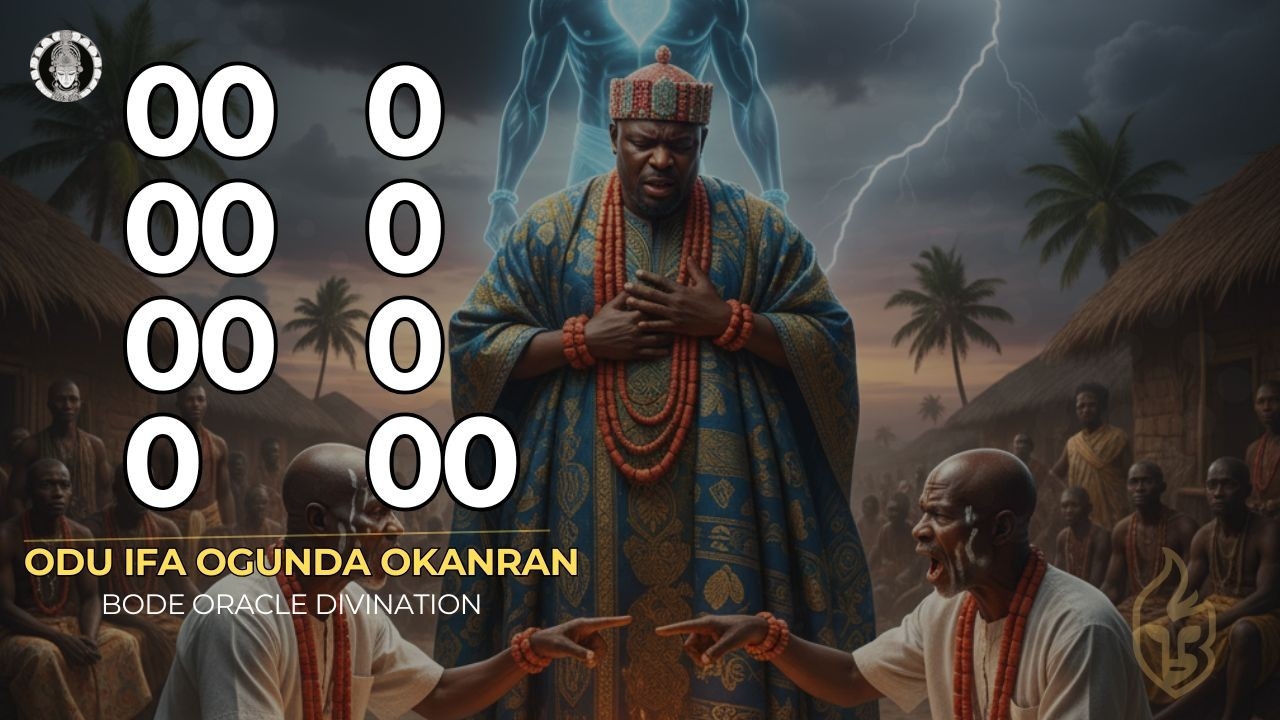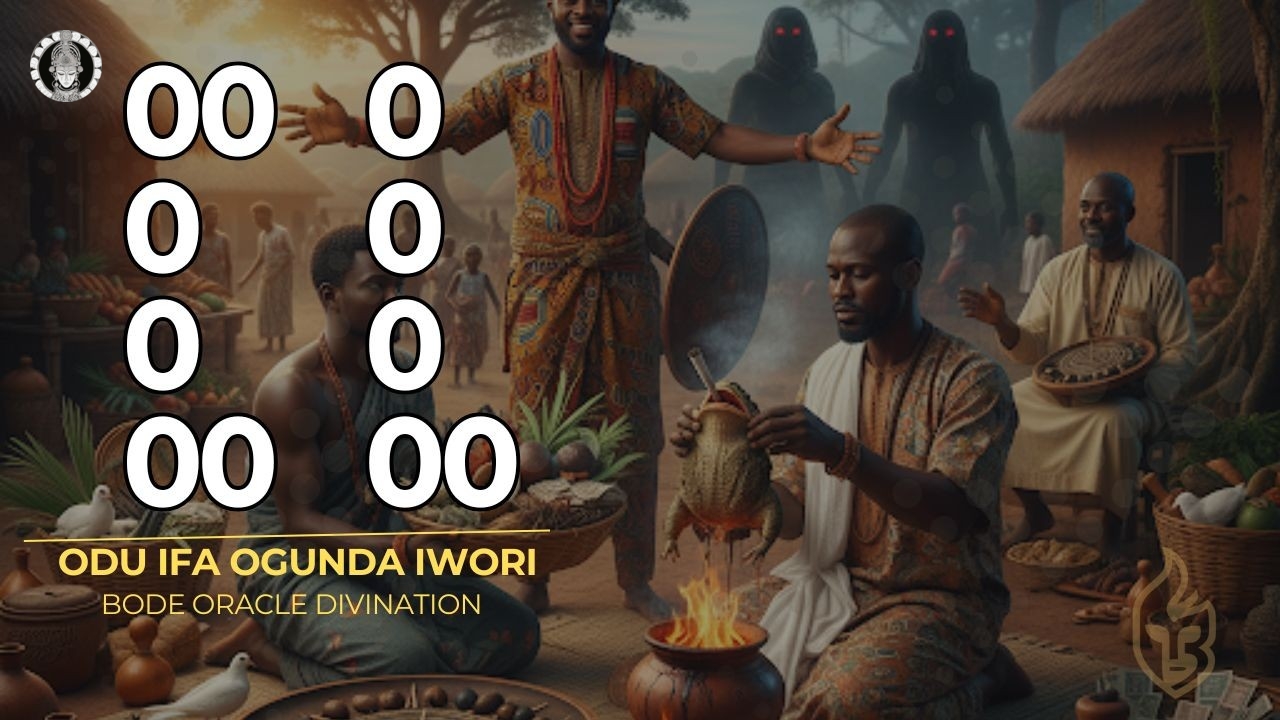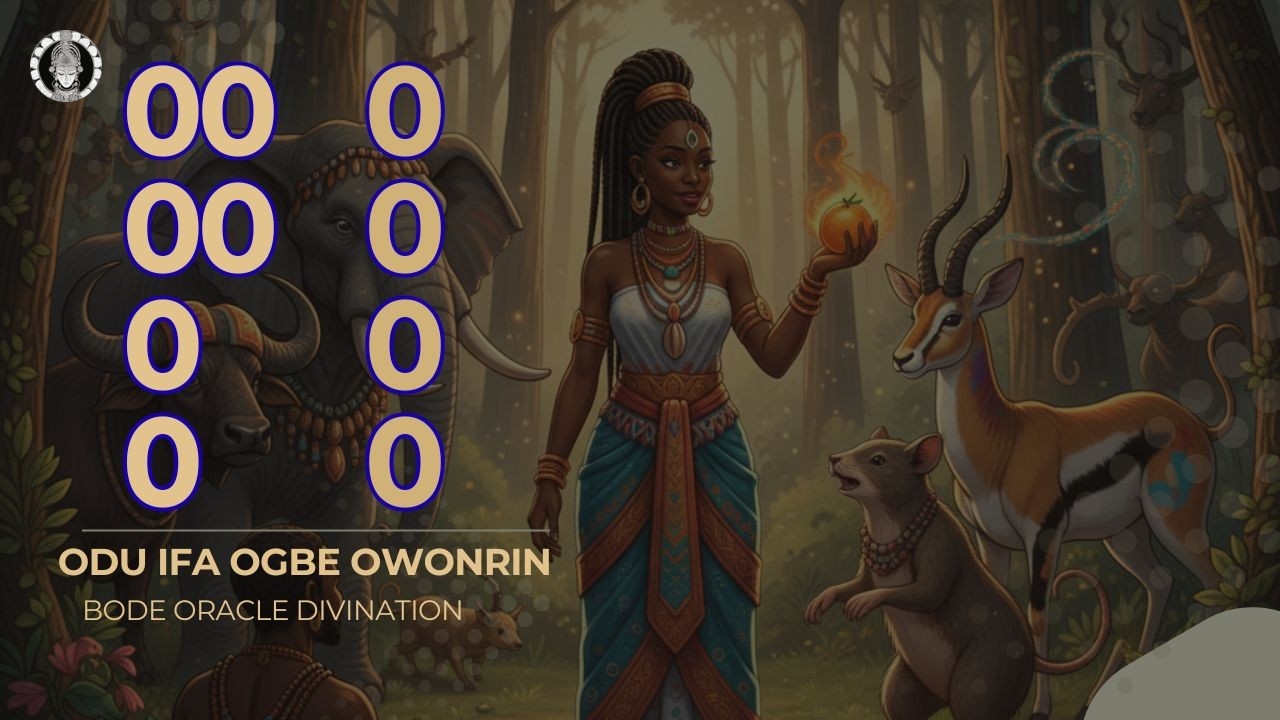Introduction to Odu Ifa Ogbe Owonrin (Ogbe Wunle)
Odu Ifa Ogbe Owonrin, also known as Ogbe Wunle, represents one of the 256 sacred divination signs in the Ifa corpus. This powerful Odu carries critical messages about the absolute necessity of obedience to spiritual guidance, the devastating consequences of stubbornness and pride, the surprising triumph of humility over status, and the abundant blessings—particularly fertility—that come through complete compliance with prescribed sacrifices. The name "Ogbe Wunle" itself suggests entering or coming into completion, emphasizing that blessings manifest only through full obedience, not partial compliance.
The divinations within Ogbe Owonrin present stark contrasts between obedience and disobedience, humility and pride, wisdom and cleverness. Through tragic stories and triumphant reversals, this Odu teaches that spiritual instructions are not suggestions to be modified according to personal preference but absolute requirements for achieving desired outcomes. Whether addressing parents seeking to protect their children, individuals competing for opportunities, couples desiring fertility, or spouses trying to preserve relationships, Ogbe Owonrin consistently demonstrates that half-hearted spiritual practice produces full-hearted tragedy. For comprehensive understanding of the 16 Odu Ifa and their meanings, explore our detailed guide.
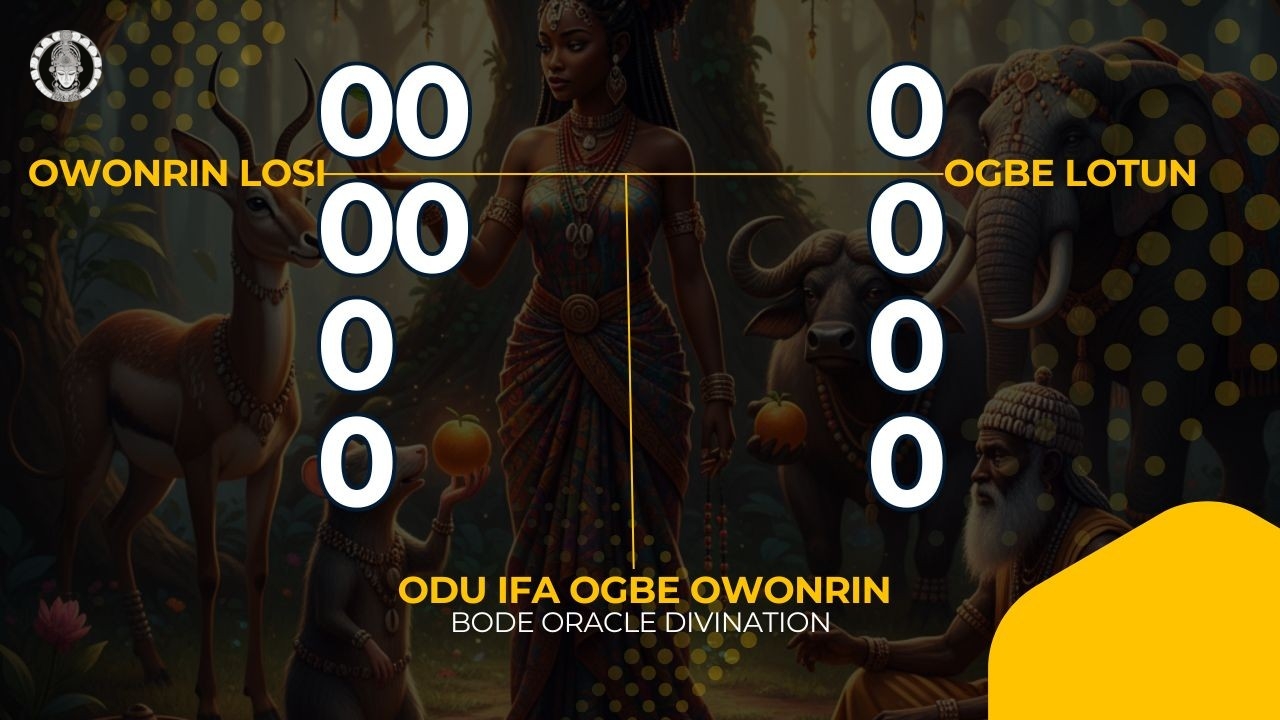
Ifa Divination for Elediro: The Tragic Consequences of Stubborn Disobedience
The Crisis of Childhood Illness and Parental Responsibility
This divination from Ogbe Owonrin presents one of Ifa's most sobering warnings about the consequences of spiritual disobedience. Elediro, a hen in ancient times, faced every parent's nightmare—her chicks were suffering from a severe head illness (àrun orí). The affliction was serious and worsening, threatening the lives of her offspring. In her desperation, she sought spiritual guidance, demonstrating at least initial wisdom in recognizing that the problem required divine intervention.
What makes this divination particularly tragic is not the initial problem but Elediro's response to the solution. The Awo (Ifa priests) diagnosed the spiritual cause and prescribed specific sacrifices to reverse the illness. The prescription was clear, the path to healing was identified, and the remedy was accessible. Yet despite having both the problem clearly identified and the solution precisely prescribed, Elediro made a fatal choice: she refused to perform the sacrifice.
The Sacred Verse
Ìté gùdùgbè
Ló d'Ífá fún Elédìró
English Translation
Listen to what Ifa has said.
Ìté gùdùgbè
Consulted Ifa for Elédìró.
The Nature of Stubborn Disobedience
The verse describes Elediro's response with a telling phrase: "ó fi gbigbó ṣe aláigbó" (in stubbornness, she ignored the advice). This wasn't ignorance—she heard clearly. This wasn't inability—the sacrifice was within her capacity. This wasn't misunderstanding—the instructions were explicit. This was pure stubbornness, a deliberate choice to reject divine guidance despite understanding it fully.
This distinction is critical in understanding Ogbe Owonrin's message. The Odu doesn't address those who never seek guidance or those who genuinely cannot afford sacrifices. It specifically warns against those who consult Ifa, receive clear instructions, possess the means to comply, yet stubbornly refuse because the guidance doesn't align with their preferences or because they believe they know better than the spiritual authorities.
The Escalation of Consequence
The divination describes a tragic progression: "Ni àrun àwọn ọmọ rè bá tún pò si" (the illness among the chicks worsened). This teaches a profound spiritual principle—refusing prescribed spiritual remedies doesn't maintain the status quo; it accelerates decline. The illness that prompted the consultation intensified precisely because the remedy was rejected.
This escalation demonstrates that spiritual problems, unlike some physical ailments, don't resolve themselves through time or passive waiting. They require active spiritual intervention. When that intervention is prescribed but refused, the spiritual forces causing the problem interpret the refusal as permission to intensify their effects.
The Innocent Victims of Parental Disobedience
The most heartbreaking aspect of this divination is expressed in its conclusion: "Báyíí ni àrun orí yíí ṣe ńpa àwọn ọmọ ré. ṣúgbón ki ó tó di wipe wọn ó ma fi ọrún yi'lè, wọn ó mo wipé, iyá áwọn ni kò ṣ'ẹbọ" (The head illness eventually led to the death of the chicks. Before their deaths, however, they did not realize that their mother had failed to perform the required sacrifice).
This devastating detail teaches that children often suffer the consequences of their parents' spiritual negligence without understanding why. The chicks died not because of anything they did, not because Ifa was powerless to help, not because the remedy was unavailable, but solely because their mother's stubbornness prevented the spiritual intervention that would have saved them.
The phrase "wọn ó mo wipé" (they did not realize) adds another layer of tragedy. The chicks died confused, perhaps believing their suffering was random misfortune or divine cruelty, never knowing that their mother's single decision—her refusal to sacrifice—had sealed their fate. This ignorance compounds the tragedy because it prevented them from even appealing to their mother or seeking help elsewhere.
Modern Applications and Warnings
In contemporary contexts, this divination speaks to any situation where parents or guardians receive clear guidance—whether spiritual, medical, educational, or otherwise—that could protect their dependents but choose to ignore it out of stubbornness, pride, or misplaced confidence in their own judgment.
The medical parallel is obvious: parents who refuse effective treatment for their children's serious illnesses, substituting their own theories or preferences for professional medical advice, mirror Elediro's tragic choice. The educational parallel is equally clear: guardians who ignore expert guidance about their children's learning needs, insisting they know better than qualified educators, risk their children's future development.
However, Ogbe Owonrin's specific focus is on spiritual disobedience. It warns that when Ifa prescribes specific sacrifices or spiritual interventions to protect children or dependents, partial compliance or substitution of personal strategies for prescribed remedies will not produce the desired protection. The Odu teaches that there are some problems that can only be solved through precise spiritual means, and refusing those means guarantees tragic outcomes.
Prescribed Offerings (Ebo)
For those receiving Ogbe Owonrin regarding threats to children's health or well-being, Ifa prescribes specific sacrifices to ward off illness and danger. The exact nature of these offerings varies based on the specific threat and should be determined through consultation with a qualified Babalawo. However, the divination's primary message transcends the specific items: whatever is prescribed must be performed completely, immediately, and without substitution. For scholarly perspectives on Ifa as a knowledge system, refer to comprehensive resources on African Traditional Religions and Ifa Divination.
Ifa Divination for Molujanjan: When Humility Defeats Pride
The Competition for Marriage and the Test of Character
This divination from Ogbe Owonrin presents one of Ifa's most instructive parables about the relationship between status, humility, and success. Molujanjan, the daughter of Olúigbó (the forest lord), had reached marriageable age, and the animals of the forest competed intensely for her hand. This wasn't a simple courtship but a formal competition that would reveal each suitor's true character and spiritual wisdom.
The competing animals represented a clear hierarchy of forest power and status. The elephant (erin) proclaimed himself "olórí igbó" (leader of the forest)—the acknowledged king whose size, strength, and authority were unmatched. The buffalo (ẹfọn) identified as "ọmọ òdòfin" (child of Odofin), claiming noble lineage. The antelope (àgbònrín) called himself "ọmọ abilá" (child of Abila), asserting his own prestigious ancestry. Against these giants of status stood Oore, a small rodent whom the larger animals dismissively called "ẹrú àwa" (our servant).
The Sacred Verse
Aye gbe hin
Aye gbe òhun
A d'Ifá fún érìnlójọ ẹranko
L'ọjó tí wón ńlọ rèé fé Mọlújanjan ọmọ ulúigbó
Aye gbe óhún
A d'Ifá fún oorẹ sẹgi-sẹgi
L'ọjọ tó ńlọ rèé fé Mọlújanjan ọmọ olùigbó
English Translation
Ayegbe hin
Ayegbe òhun
This was the Ifá cast for the animals
On the day they were competing to marry Molujanjan, the child of Olúigbó.
Ayegbe òhun
This was the Ifá cast for Oore Sẹgi-Sẹgi (the rodent that breaks wood)
On the day they were competing to marry Molujanjan, the child of Olúigbó.
The Spiritual Divide: Who Made Sacrifice?
When all the animals consulted Ifa about their marriage quest, the prescription was identical for everyone: perform the prescribed sacrifice. This equality of spiritual instruction is significant—Ifa didn't give the elephant special consideration for his size, didn't grant the buffalo advantage for his lineage, didn't favor the antelope for his speed. The spiritual requirement was democratically distributed: everyone needed to sacrifice.
However, the response to this instruction revealed the true character hierarchy. The verse states clearly: "Oorẹ nikan ló rú'bọ. Àwọn ẹranko yoku ó rú'bọ" (Only Oore made the sacrifice. The other animals did not make the sacrifice). This single sentence contains the entire divination's lesson—not size, not status, not confidence, but obedience determined the outcome.
Why did the large animals refuse? The text provides a crucial insight: "Wọn l'áwọn ó rú'bọ" (They were told they must offer sacrifice). They heard the instruction. They understood the requirement. Yet they refused, believing their natural advantages—the elephant's power, the buffalo's nobility, the antelope's prestigious lineage—made spiritual preparation unnecessary. Their pride whispered that beings of their status didn't need to perform sacrifices to win brides; their mere presence should suffice.
The Test: The Orange of Spiritual Preparation
Olúigbó's test was brilliantly designed: "ẹní tí ọmọ óun bá dìmó, tó gba ọsán l'ọwọ rè ni yí óò fẹ" (whoever Molujanjan collects the orange from would marry her). On the surface, this appeared to be Molujanjan's personal choice—she would select her husband by accepting an orange from him. However, the divination reveals a deeper truth: "ọsàn tí oorẹ rà ni àwọn Awo bá ṣe Ifá sí" (the orange that Oore bought was the one for which the Ifá priests performed the rites).
This detail is crucial. All the animals brought oranges, but only Oore's orange had been spiritually prepared through Ifa rites. This demonstrates a fundamental principle: identical physical objects become spiritually distinct through proper ritual preparation. The orange in Oore's hand looked no different from those held by the elephant, buffalo, or antelope, but it carried spiritual power that would compel Molujanjan's choice.
The Songs of Status and the Response of Destiny
When the day of decision arrived, each animal sang to attract Molujanjan, and their songs reveal their character. Each large animal's song followed an identical pattern: they acknowledged the status of the others before asserting their own superiority, and they all concluded by dismissing Oore as "ẹrú àwa" (our servant). This repetitive denigration of the small rodent demonstrates their contempt—they couldn't even compete without reminding everyone that Oore was beneath them.
However, when Oore sang, he demonstrated remarkable humility. His song acknowledged all the others' claims to status—he called the elephant the leader of the forest, recognized the buffalo's noble lineage, honored the antelope's prestigious ancestry—and only when mentioning himself repeated their characterization: "Èmi oorẹ l'ẹrú àwa" (I am Oore, our servant). He didn't argue with their assessment or defend his status. He simply acknowledged their perception and presented his spiritually prepared offering.
Molujanjan's response was immediate and dramatic: "Ni Mọlújanjan bá sáré" (Molujanjan ran to Oore). She didn't walk thoughtfully, didn't hesitate, didn't even pause to consider the elephant's power or the buffalo's nobility. She ran—an instinctive, uncontrollable attraction to the one whose offering carried spiritual power. Her exclamation reveals her understanding: "Ìyẹn ni wipe iwọ kíí ṣe ẹrù awon yi" (This means you are not their servant). The spiritual preparation elevated Oore beyond his social status, revealing his true position.
Prescribed Offerings (Ebo)
For those receiving Ogbe Owonrin regarding competition, marriage, or situations where they feel disadvantaged by status or appearance, Ifa prescribes specific sacrifices that spiritually level the playing field. The divination emphasizes that these offerings must be taken to proper spiritual authorities for ritual preparation, as Oore did with his orange. The physical offering is merely the vehicle; the spiritual rites performed upon it create the actual power. Explore more wisdom from our collection of Ifa teachings.
Modern Application: Beyond Surface Advantages
In contemporary contexts, this divination addresses any competitive situation where some participants appear to have overwhelming natural advantages. Job searches where others have better credentials, business competitions against larger companies, romantic pursuits where rivals seem more attractive, academic settings where peers appear more intelligent—all these mirror the animals' competition for Molujanjan.
Ogbe Owonrin teaches that surface advantages mean nothing against spiritual preparation. The small company that properly prepares can win contracts against corporations. The apparently ordinary candidate who follows spiritual guidance can secure opportunities over seemingly superior rivals. The key is not attempting to compete on the dimension where you're disadvantaged (Oore didn't try to become larger) but instead accessing the spiritual dimension where proper preparation equals the playing field.
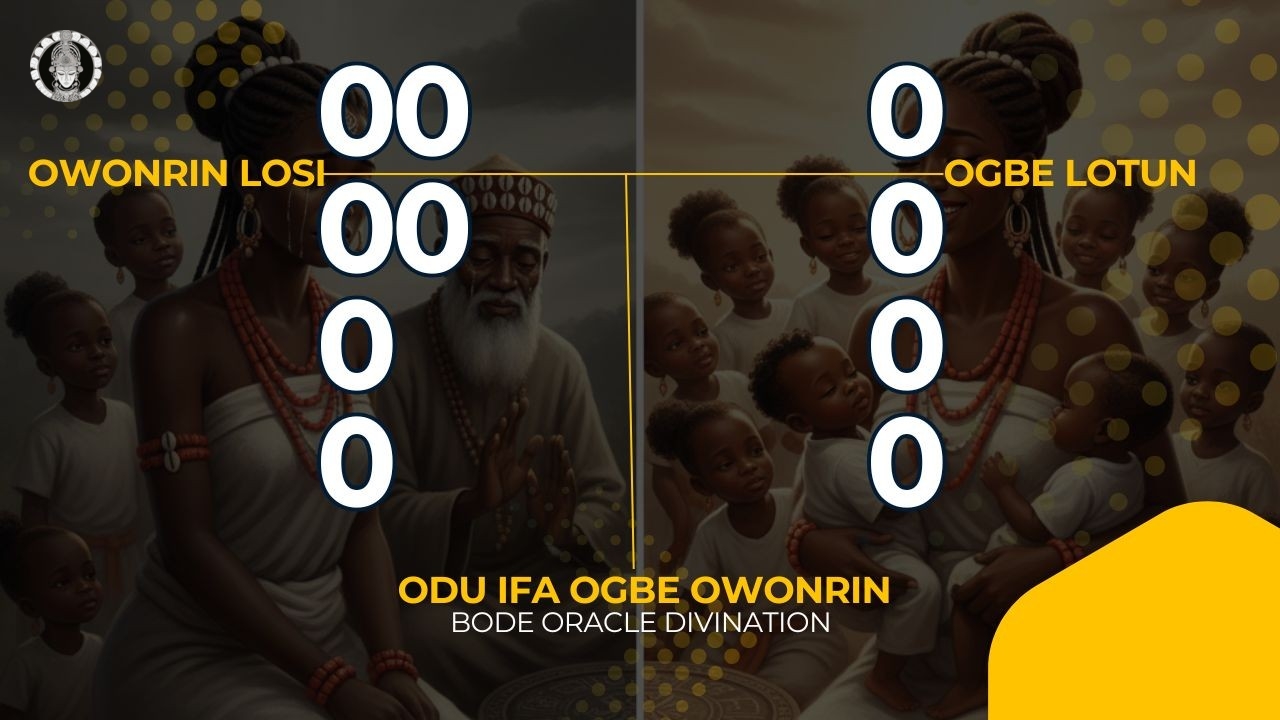
Ifa Divination for Yeemoo: Divine Intervention in Barrenness
The Long Struggle with Infertility
This divination from Ogbe Owonrin addresses one of life's most painful experiences—long-term infertility that seems impervious to all natural remedies. Yeemoo, described as "obinrin Òrìṣà" (woman of the Orisa), represents those who have tried everything within human capacity yet remain childless. The verse states powerfully: "Óṣe titi kò rí ọmọ bi: ojú ọmọ pọn púpò" (She had tried for a long time but could not conceive; the desire for children consumed her greatly).
This description captures not just physical inability but psychological and spiritual anguish. The phrase "ojú ọmọ pọn púpò" (the desire for children consumed her greatly) suggests that infertility had become her defining experience, overshadowing all other aspects of life. This intense longing, combined with repeated disappointment, creates a particular kind of suffering that only those who have experienced it can fully understand.
The Sacred Verse
Egbirin l'awo aja ile
A d'Ifá fún yemòó
Ti i ṣe obinrin Òrìṣà
L'ójó tí ó ńsunkún pé óun kó bí'mọ
English Translation
Egbirin is the beauty of the household.
Ifá was consulted for Yemọ́ọ,
Who is the wife of the Òrìṣà,
On the day she was weeping that she had no child.
The Decision to Seek Spiritual Intervention
The turning point in Yeemoo's story comes with a crucial action: "Ni ó bá mú ééjì kún ééta ó lọ si oko awo" (In her desperation, she put one and two together and went to consult the Ifá priests). This phrase "mú ééjì kún ééta" (literally "took two and added to make three") is a Yoruba idiom meaning to gather one's resources, make a decision, and take action after careful thought.
This detail is significant because it shows that Yeemoo didn't immediately run to Ifa at the first sign of difficulty. She tried natural means extensively. Only after exhausting human possibilities did she turn to divine intervention. This progression teaches that spiritual solutions are not alternatives to responsible human effort but resources accessed when human capacity reaches its limits.
The Promise and the Sacrifice
The Awo's message to Yeemoo was direct and expansive: "Ifá pé kó rú'bọ. Yi óò bi'mọ púpò" (Ifá told her to offer sacrifice. She would bear many children). Notice the promise didn't just address her immediate concern (having a child) but exceeded it (having many children). This teaches that when Ifa intervenes in barrenness, the blessing often surpasses the original request.
The verse emphasizes Yeemoo's response: "Wón yán án l'ẹbọ. Yemóò rú'bọ" (The diviners chose the sacrifice for her, and Yeemoo performed the offering). Unlike Elediro who refused sacrifice and lost her children, or the large animals who dismissed sacrifice and lost marriage, Yeemoo complied completely. This compliance becomes the pivot point where human impossibility transforms into divine possibility.
Divine Response: Sixteen Children from Heaven
The culmination of this divination contains one of Ifa's most remarkable statements about divine intervention: "Olòdùmarè sì gbọ ohún un rẹ, ó sì fì ọmọ mérìndìnlógún rànṣé si láti òde òrun" (God heard her cries and sent her sixteen children from the heavens). This phrase reveals several profound truths about how Ifa understands fertility and divine blessing.
First, the response came directly from Olódùmarè (the Supreme God), indicating that some blessings require the highest level of divine intervention. While various spiritual forces can assist with many life challenges, ultimate creative power—bringing life from nothing—belongs to God alone. Yeemoo's sacrifice didn't manipulate or coerce; it created conditions where God's mercy could manifest.
Second, the children came "láti òde òrun" (from the heavens). This suggests that these weren't merely biological offspring but souls specifically sent by divine decree. In Yoruba spirituality, each person's ori (spiritual head/destiny) exists in heaven before birth and chooses when and to whom to be born. Yeemoo's sacrifice apparently attracted sixteen ori to choose her as their earthly mother.
Third, the number sixteen (mérìndìnlógún) itself is significant in Yoruba numerology. It represents completeness and abundance. Yeemoo didn't just escape barrenness; she became a mother of exceptional fruitfulness. The woman who had cried for even one child received sixteen—a transformation from emptiness to overflow.
Prescribed Offerings (Ebo)
For those receiving Ogbe Owonrin regarding fertility challenges, Ifa prescribes specific sacrifices to open closed wombs and attract children. The exact offerings vary based on individual circumstances and should be determined through consultation with a qualified Babalawo. However, the divination's message is clear: even long-standing, seemingly hopeless infertility can be reversed through proper spiritual intervention. For understanding the artistic and cultural dimensions of Ifa practice, explore UNESCO recognition of Ifa divination system.
Modern Relevance and Integration with Medical Care
In contemporary contexts, this divination doesn't suggest abandoning medical fertility treatments but rather integrating spiritual preparation with medical intervention. Many modern practitioners combine consultations with fertility specialists with prescribed Ifa sacrifices, understanding that physical and spiritual dimensions of fertility can be addressed simultaneously.
The story of Yeemoo also speaks metaphorically to any form of creative barrenness—artists unable to create, entrepreneurs unable to generate successful ventures, scholars unable to produce meaningful work. The principles remain constant: exhaust reasonable human efforts, recognize when you've reached human limits, seek spiritual intervention through proper channels, perform prescribed sacrifices completely, and trust that divine response may exceed your original request.
Ifa Divination for Porogodo: The Tragic Consequences of Substituting Cleverness for Obedience
The Fear of Loss and the Search for Protection
This divination from Ogbe Owonrin presents one of Ifa's most poignant warnings about the limits of human intelligence when separated from spiritual guidance. The woodpecker (ákókó) became suspicious that someone wanted to steal his wife, Porogodo. This fear wasn't irrational—the verse indicates "Ákókó fura wipe wón fé gba Ìyàwò òun" (The woodpecker suspected that someone wanted to take his wife). In relationships and marriage, such fears sometimes have foundation, and seeking protection is both wise and responsible.
The woodpecker's initial response was correct: "ni ó bá lọ ṣe àyéwó" (he went to seek guidance). He recognized that protecting his marriage required more than just vigilance or physical security measures. He understood that relationships exist in both physical and spiritual dimensions, and threats to them require spiritual as well as practical responses. This recognition demonstrates wisdom beyond his later foolishness.
The Sacred Verse
Imú ilé là á hun
Kí a tó ma hun òde
A d'Ìfá fún porogodo
Tíì ṣe obinrin ákókó.
English Translation
We weave the roof first
Before weaving the walls
This was the Ifá cast for Porogodo,
The wife of the woodpecker.
The Fatal Choice: Cleverness Over Obedience
When the Awo prescribed sacrifice for the woodpecker's protection, his response revealed his character: "Ṣùgbón àkókò kò rú'bọ: ó ní kaka kí óun ó rú'bọ, ogbọn ni òun ó ta" (However, the woodpecker refused to offer the sacrifice, insisting that instead of doing the ritual, he would rely on his cleverness). This statement contains the entire tragedy in miniature—the explicit rejection of spiritual guidance in favor of personal strategy.
The woodpecker's reasoning seemed logical. He possessed a unique ability—his strong beak could hollow out holes in trees. He could create hiding places inaccessible to others. Why waste resources on sacrifice when his natural talents provided a superior solution? His plan appeared foolproof: hide Porogodo in a tree cavity, seal it completely, and no one could find or take her. The strategy combined his biological advantage (the powerful beak) with his intelligence (the idea of concealment), creating what seemed like perfect security.
The divination describes his execution: "Ni àkókò bá lọ fi ẹnu gbé íhò sí ara igi kan, ni ó bá lọ gbé iyawo rè pamo si inú ihò igi yìí, ni ó bá dí i pa" (The woodpecker then used his beak to hollow out a hole in a tree and hid his wife inside, sealing the hole tightly). From a purely physical perspective, this was excellent security. The hiding place was custom-made, perfectly concealed, and known only to him. No enemy could stumble upon it; no rival could breach it. By every measure of human cleverness, the plan was brilliant.
The Ironic Punishment: Forgetting What Cleverness Created
The divination's conclusion delivers devastating irony: "Ṣùgbón gégé bi àìgbónran átí ẹjá dida, àkókò padá dé ibi igi kò mọ ojú ibiti ó gbé ìyàwò rè sí mọ" (But because of his disobedience and arrogance, the woodpecker later forgot the exact spot where he had hidden his wife). The very intelligence he relied upon—his memory, his orientation, his ability to recognize his own work—failed him precisely because he had rejected spiritual protection.
This wasn't simple forgetfulness or natural memory loss. The phrase "gégé bi àìgbónran átí ẹjá dida" (because of his disobedience and arrogance) indicates that the memory loss was a direct spiritual consequence of refusing prescribed sacrifice. When we reject spiritual guidance in favor of cleverness, we lose the very cognitive abilities we relied upon. The woodpecker's intelligence, separated from spiritual support, turned against him.
The Eternal Search and Perpetual Regret
The final verse contains haunting imagery: "Láti ákókò yìí ni ákókò tí ma á fi énu sọ igi káákiri ayé, ti ìdààmú sí ba, tí yí óó ma wípé 'porogodo, porogodo'" (Since that day, the woodpecker has roamed the earth tapping on trees with his beak, distressed and endlessly calling out "porogodo, porogodo" as he searches for his wife in vain).
This ending transforms the woodpecker's characteristic behavior—tapping on trees—from a natural feeding behavior into a symbol of eternal searching and regret. Every woodpecker's tap is now understood as the continued search for Porogodo, and every call is interpreted as crying her name in desperation. The bird that relied on its cleverness now uses that same ability (the strong beak) not to create security but to conduct an endless, futile search for what it lost through cleverness.
Prescribed Offerings (Ebo)
For those receiving Ogbe Owonrin regarding threats to relationships or marriage, Ifa prescribes specific sacrifices to create spiritual barriers against those who would take one's spouse. The divination emphasizes that these protections operate in dimensions inaccessible to human cleverness alone. Physical security measures—locks, secrets, isolation—may be necessary but insufficient without spiritual protection. For deeper understanding of Yoruba spiritual philosophy and divination systems, consult UNESCO documentation on Ifa of the Yoruba People.
Modern Application: The Limits of Strategy
In contemporary contexts, this divination speaks to any situation where people attempt to solve spiritual problems through purely intellectual or strategic means. Business owners who rely solely on clever strategies while ignoring spiritual foundations, couples who try to save marriages through counseling alone while refusing spiritual intervention, individuals who attempt to secure their futures through planning without spiritual grounding—all mirror the woodpecker's fatal choice.
The divination doesn't condemn intelligence or strategy. The problem wasn't that the woodpecker was clever; the problem was that he substituted cleverness for obedience. Had he performed the sacrifice AND used his intelligence to create the hiding place, he would have combined spiritual protection with practical security. Instead, he created a false choice between spiritual obedience and personal cleverness, chose cleverness, and lost everything he tried to protect.
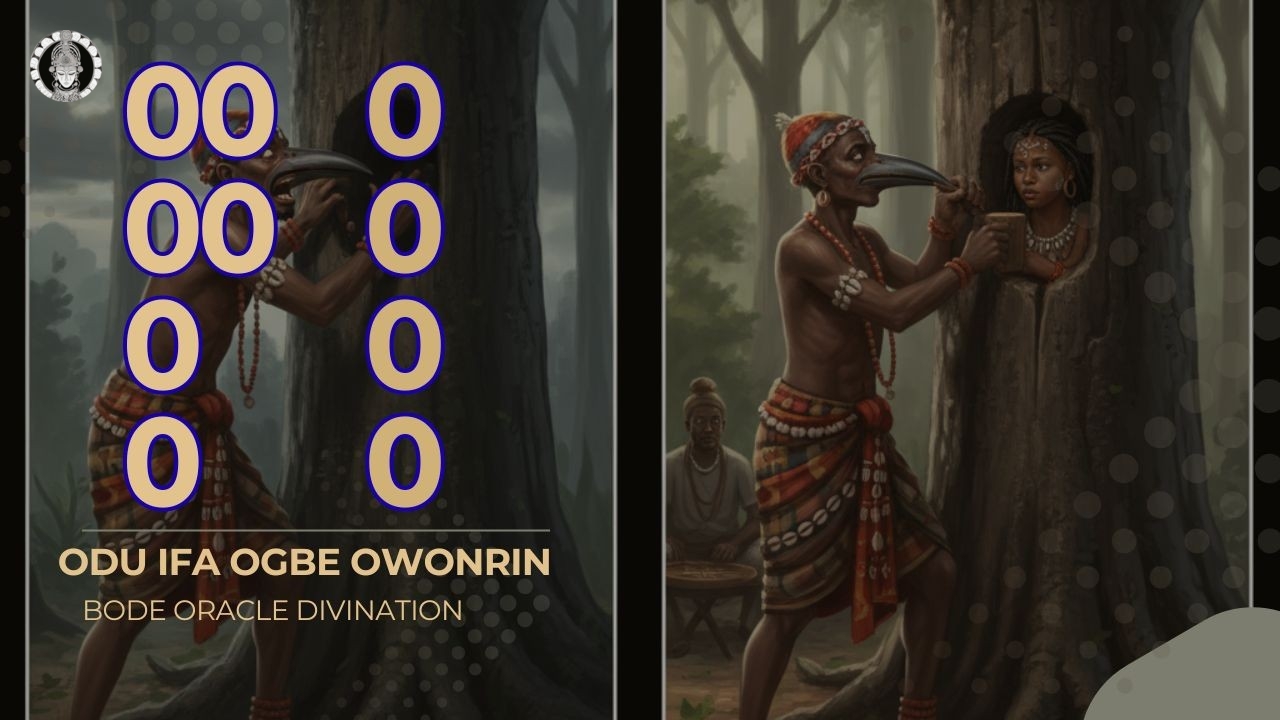
Additional Resources
Internal Links
- Complete Guide to Ogbe Owonrin - Detailed information, taboos, and practices
- Ogbe Owonrin Blog Post
- Bode.ng Blog - Extensive collection of Ifa and Yoruba spirituality articles
- Complete Odu Ifa Directory
- All About the 16 Odu Ifa and Their Meaning
External Resources
- African Traditional Religions: Ifa Divination - Duquesne University
- Ifa of the Yoruba People of Nigeria - UNESCO
- UNESCO Recognition of Ifa Divination System
- Ifa Divination System - Wikipedia
- Algebraic Characterization of Ifa Main Divination Codes
- Opon Ifa (Divination Tray) - Wikipedia
Connect With Us on Social Media
- BODE Oracle on TikTok
- BODE Oracle on YouTube
- BODE Oracle on Facebook
- BODE Oracle on X (Twitter)
- BODE Oracle on Pinterest
Visit Bode.ng to explore more divination teachings, participate in quizzes and polls, and connect with our community of practitioners and learners. Register today to access exclusive content and personalized guidance on your spiritual journey.
Frequently Asked Questions And Answers About Odu Ifa Ogbe Owonrin (Ogbe Wunle)
Find answers to common questions about this sacred Odu Ifa and its divination teachings
Ogbe Owonrin, also called Ogbe Wunle, is one of the 256 sacred Odu (divination signs) in the Ifa corpus. It carries profound messages about the critical importance of obedience to spiritual guidance, the consequences of pride and stubbornness, humility as the path to unexpected blessings, and fertility granted through proper sacrifice. This Odu teaches that spiritual instructions must be followed completely, regardless of one's perceived status or intelligence.
The divination of Elediro (the hen) demonstrates the tragic consequences of disobedience. When the hen refused to perform the prescribed sacrifice despite her chicks suffering from head illness, the disease worsened and killed them. This story teaches that stubbornness in spiritual matters leads to preventable tragedy, and that children often suffer the consequences of their parents' spiritual disobedience.
The divination of Molujanjan reveals that humility, not status, determines success. When animals competed to marry Molujanjan, the great elephant, buffalo, and antelope all failed because they refused to sacrifice, believing their size and status guaranteed victory. Only Oore, the small rodent who humbly made the sacrifice, won her hand. This teaches that spiritual preparation overcomes natural disadvantage, and pride leads to unexpected defeat.
The divination of Yeemoo demonstrates Ifa's power to grant fertility. When this barren woman consulted Ifa and performed the prescribed sacrifice, God sent her sixteen children from heaven. This teaches that even long-standing infertility can be reversed through proper sacrifice, and that divine intervention can exceed all expectations—she didn't just receive one child but abundant offspring.
The divination of Porogodo teaches about the consequences of relying on personal cleverness instead of spiritual guidance. The woodpecker, fearing his wife would be taken, refused to sacrifice and instead hid her in a tree using his intelligence. However, he forgot where he hid her and has searched ever since. This demonstrates that human cleverness without spiritual support leads to loss, and that some protections require divine intervention rather than mere strategy.
Ogbe Owonrin repeatedly emphasizes that partial obedience equals disobedience. The hen heard the prescription but refused to act. The large animals knew they should sacrifice but believed their status exempted them. The woodpecker sought guidance but rejected it in favor of his own plan. Each case demonstrates that acknowledging spiritual wisdom without implementing it produces the same tragic results as ignorance.
The Molujanjan story teaches that underestimating others based on appearance or status leads to defeat. The powerful animals dismissed Oore as beneath them, even calling him their servant in their songs. Yet this small creature they despised won the prize because he took spiritual preparation seriously. This teaches that success comes not from impressive appearance but from proper relationship with divine guidance.
The woodpecker's story warns that trying to protect loved ones through cleverness alone, while refusing spiritual guidance, leads to losing them entirely. The Odu prescribes sacrifice to prevent spouses from being taken by force or circumstance. It teaches that true protection of relationships requires spiritual intervention, not just physical security measures or intellectual strategies.
Stubbornness is identified as the root cause of tragedy in multiple divinations. The hen's stubbornness killed her chicks. The large animals' stubbornness cost them marriage. The woodpecker's stubbornness lost him his wife forever. Ogbe Owonrin teaches that stubbornness in spiritual matters is not strength or independence but foolishness that produces preventable suffering.
The principles remain relevant: follow professional advice completely rather than partially, don't let ego prevent you from accepting help, don't underestimate competitors based on appearance, recognize that intelligence alone cannot replace proper preparation, and understand that protecting what matters requires more than clever strategies. The Odu teaches that obedience to wisdom—whether spiritual, professional, or experiential—produces better outcomes than relying solely on personal intelligence or status.
Ogbe Owonrin prescribes different sacrifices for different situations: for protecting children from illness, for fertility and conceiving children, for winning competitions or gaining favor, and for protecting marriages and relationships. The specific offerings vary by circumstance and should be determined through consultation with a qualified Babalawo. However, the consistent message is that the sacrifice must be performed completely, not partially or substituted with personal strategies.
Explore comprehensive information through: Complete Guide to Ogbe Owonrin at bode.ng/ogbe_owonrin for detailed taboos and practices, Ogbe Owonrin Blog Post at bode.ng/read-blog/182_ogbe-owonrin.html, Bode.ng Blog at bode.ng/blogs for extensive Ifa articles, Complete Odu Ifa Directory at bode.ng/odu/, and Bode.ng at bode.ng for divination services. Connect on social media: TikTok, YouTube, Facebook, X (Twitter), and Pinterest @BODEOracle.
